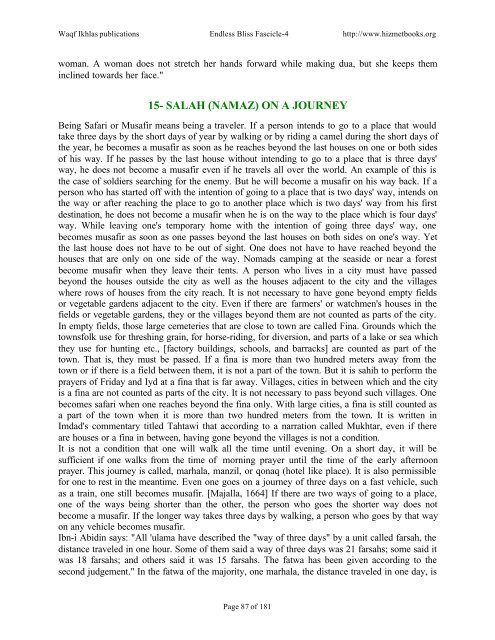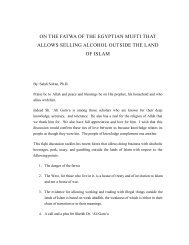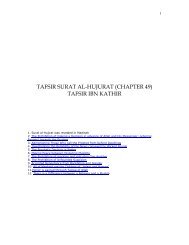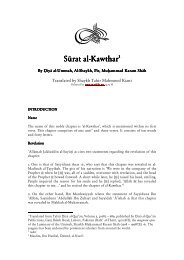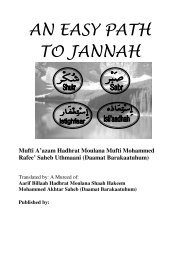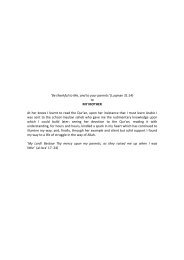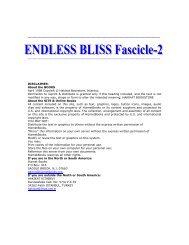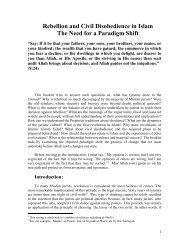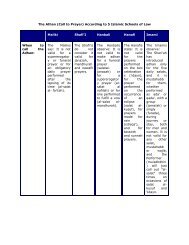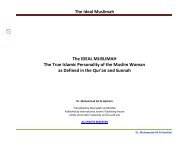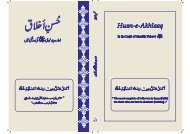ENDLESS BLISS FASCICLE-4
ENDLESS BLISS FASCICLE-4
ENDLESS BLISS FASCICLE-4
Create successful ePaper yourself
Turn your PDF publications into a flip-book with our unique Google optimized e-Paper software.
Waqf Ikhlas publications Endless Bliss Fascicle-4 http://www.hizmetbooks.org<br />
woman. A woman does not stretch her hands forward while making dua, but she keeps them<br />
inclined towards her face."<br />
15- SALAH (NAMAZ) ON A JOURNEY<br />
Being Safari or Musafir means being a traveler. If a person intends to go to a place that would<br />
take three days by the short days of year by walking or by riding a camel during the short days of<br />
the year, he becomes a musafir as soon as he reaches beyond the last houses on one or both sides<br />
of his way. If he passes by the last house without intending to go to a place that is three days'<br />
way, he does not become a musafir even if he travels all over the world. An example of this is<br />
the case of soldiers searching for the enemy. But he will become a musafir on his way back. If a<br />
person who has started off with the intention of going to a place that is two days' way, intends on<br />
the way or after reaching the place to go to another place which is two days' way from his first<br />
destination, he does not become a musafir when he is on the way to the place which is four days'<br />
way. While leaving one's temporary home with the intention of going three days' way, one<br />
becomes musafir as soon as one passes beyond the last houses on both sides on one's way. Yet<br />
the last house does not have to be out of sight. One does not have to have reached beyond the<br />
houses that are only on one side of the way. Nomads camping at the seaside or near a forest<br />
become musafir when they leave their tents. A person who lives in a city must have passed<br />
beyond the houses outside the city as well as the houses adjacent to the city and the villages<br />
where rows of houses from the city reach. It is not necessary to have gone beyond empty fields<br />
or vegetable gardens adjacent to the city. Even if there are farmers' or watchmen's houses in the<br />
fields or vegetable gardens, they or the villages beyond them are not counted as parts of the city.<br />
In empty fields, those large cemeteries that are close to town are called Fina. Grounds which the<br />
townsfolk use for threshing grain, for horse-riding, for diversion, and parts of a lake or sea which<br />
they use for hunting etc., [factory buildings, schools, and barracks] are counted as part of the<br />
town. That is, they must be passed. If a fina is more than two hundred meters away from the<br />
town or if there is a field between them, it is not a part of the town. But it is sahih to perform the<br />
prayers of Friday and Iyd at a fina that is far away. Villages, cities in between which and the city<br />
is a fina are not counted as parts of the city. It is not necessary to pass beyond such villages. One<br />
becomes safari when one reaches beyond the fina only. With large cities, a fina is still counted as<br />
a part of the town when it is more than two hundred meters from the town. It is written in<br />
Imdad's commentary titled Tahtawi that according to a narration called Mukhtar, even if there<br />
are houses or a fina in between, having gone beyond the villages is not a condition.<br />
It is not a condition that one will walk all the time until evening. On a short day, it will be<br />
sufficient if one walks from the time of morning prayer until the time of the early afternoon<br />
prayer. This journey is called, marhala, manzil, or qonaq (hotel like place). It is also permissible<br />
for one to rest in the meantime. Even one goes on a journey of three days on a fast vehicle, such<br />
as a train, one still becomes musafir. [Majalla, 1664] If there are two ways of going to a place,<br />
one of the ways being shorter than the other, the person who goes the shorter way does not<br />
become a musafir. If the longer way takes three days by walking, a person who goes by that way<br />
on any vehicle becomes musafir.<br />
Ibn-i Abidin says: "All 'ulama have described the "way of three days" by a unit called farsah, the<br />
distance traveled in one hour. Some of them said a way of three days was 21 farsahs; some said it<br />
was 18 farsahs; and others said it was 15 farsahs. The fatwa has been given according to the<br />
second judgement." In the fatwa of the majority, one marhala, the distance traveled in one day, is<br />
Page 87 of 181


